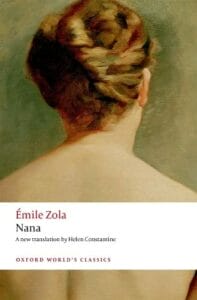
Book Summary
Nana is an exciting book written by Emile Zola, a famous French author. It tells the story of a young girl named Nana and her adventures in Paris during the 19th century. This book is full of interesting characters, thrilling events, and lots of surprises!
Nana is a captivating book that will keep you hooked from beginning to end. It is a story about a girl who dreams of becoming a famous actress. Nana faces many challenges and obstacles along the way, but she never gives up on her dreams. The book takes you on a journey through the glamorous world of theater and shows you the ups and downs of Nana’s life.
One of the things I loved about Nana is how well the author describes the characters. Each person in the book feels real and unique, with their own personalities and quirks. You will meet kind-hearted friends, cunning villains, and even some famous historical figures!
The story is also filled with exciting events and unexpected twists. From Nana’s auditions to her performances on stage, there is always something happening that will keep you on the edge of your seat. You will also learn about the fashion, culture, and lifestyle of Paris in the 19th century, which adds an extra layer of interest to the story.
Nana is a book that teaches us about the importance of perseverance and following our dreams. Nana faces many challenges and setbacks, but she never gives up. She shows us that with hard work and determination, we can achieve anything we set our minds to.
The book also explores themes of friendship and betrayal. Nana meets many different people on her journey, some of whom become her closest friends, while others turn out to be not so trustworthy. This teaches us the value of surrounding ourselves with good and loyal friends.
Emile Zola, the author of Nana, was a famous French writer who lived in the 19th century. He is known for his realistic writing style and his ability to capture the essence of French society during that time. Zola wrote many other books, but Nana is one of his most famous works. His writing has had a lasting impact on literature, and his books are still enjoyed by readers all around the world today.
“Nana” is a novel written by French author Emile Zola, first published in 1880. It is the ninth installment in Zola’s 20-volume series, “Les Rougon-Macquart,” which provides a comprehensive depiction of the Second French Empire through the lives of two families. “Nana” is a vivid portrayal of the demimonde and the decadent society of the Second Empire, focusing on the life and death of Nana Coupeau, a high-class prostitute.
“Nana” is a compelling narrative that explores the themes of sexuality, morality, and societal decadence. The novel is set in the backdrop of the French Second Empire, a period marked by material excess and moral decay. The protagonist, Nana, is a woman of humble origins who rises to become a high-class courtesan, embodying the moral corruption of the society she inhabits.
Zola’s writing is richly descriptive, painting a vivid picture of the opulence and decadence of the era. The narrative is filled with detailed descriptions of the lavish lifestyles of the upper class, their extravagant parties, and their sexual exploits. The characters are well-developed, each with their unique flaws and virtues, making them relatable and human.
The plot is engaging, filled with dramatic twists and turns that keep the reader hooked. Nana’s rise and fall are depicted with brutal honesty, showcasing the harsh realities of life in the demimonde. The novel’s ending is tragic and poignant, leaving a lasting impression on the reader.
“Nana” is a powerful critique of the Second French Empire, exposing the moral decay at the heart of its society. Zola uses the character of Nana as a symbol of this corruption. Despite her lowly origins, Nana rises to the top of society through her sexual allure, manipulating and exploiting the men who are drawn to her. Her eventual downfall reflects the inevitable collapse of the decadent society she represents.
Zola’s use of naturalism is evident in his detailed descriptions of the characters and their environment. He presents a realistic portrayal of the demimonde, highlighting the harsh realities of life for women like Nana. The novel also explores the theme of sexuality, challenging the Victorian-era norms and taboos.
The novel’s ending is a powerful commentary on the destructive power of unchecked hedonism and moral decay. Nana’s death symbolizes the downfall of the Second Empire, a society consumed by its own excesses.
Emile Zola was a French novelist, playwright, and journalist, known for his literary style of naturalism. Born in 1840, Zola was a significant figure in the political liberalization of France. His works often dealt with issues of social and political significance, reflecting his belief in the importance of social reform.
Zola’s most famous work is the 20-volume series “Les Rougon-Macquart,” which provides a comprehensive depiction of French society during the Second Empire. “Nana” is one of the most well-known novels in this series.
Zola’s writing is characterized by its detailed descriptions and realistic portrayal of characters and their environment. His works have had a significant influence on French literature and continue to be widely read and studied today.
Don Quixote by Miguel de Cervantes
Miguel de Cervantes
Read Now →